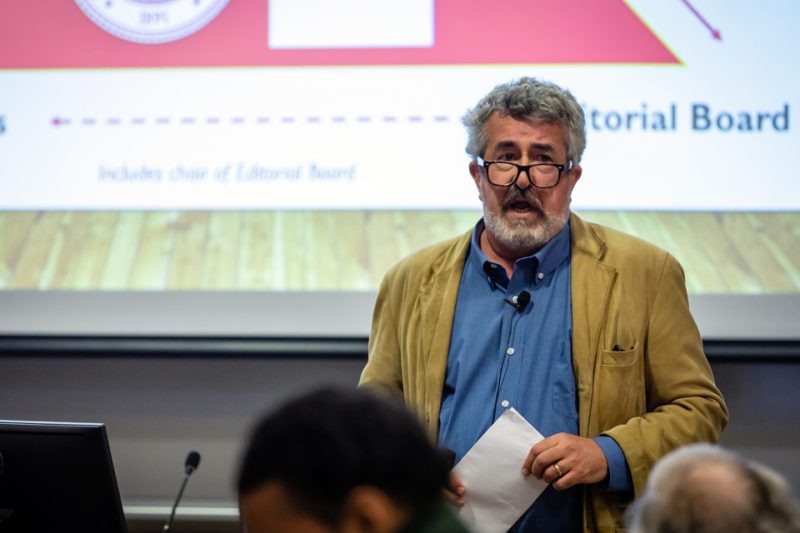The Faculty Senate gathered on Thursday to discuss recommended structural changes proposed by the Senate ad hoc committee on the Stanford University Press (SU Press). Out of three proposed motions, faculty spent the majority of the time on the first, regarding the establishment of a new standing faculty committee on SU Press, which ultimately failed to pass on a divided vote. Provost Persis Drell also announced the impending release of findings from a faculty quality-of-life survey and the formation of a new committee to find the new vice provost of undergraduate education to replace Harry Elam, who will step down at the end of this academic year.
After deliberating for a few months, the ad hoc committee, comprised of faculty across a variety of disciplines, proposed three motions outlined in a presentation. The first proposed the establishment of a permanent, standing faculty committee on SU Press made up of seven academic faculty members representing all of the major departments. This committee would act as a “press ambassador” and “make things transparent and enable communication,” according to classics professor and chair of the Senate’s ad hoc committee, Richard Martin.
The second motion proposed that Drell should work closely with the new committee to form a Board of Governors that will then report directly to the president and Board of Trustees regarding Press matters. The third would allow the standing committee to appoint faculty to the Press’s editorial board after receiving nominations.
The ad hoc committee also addressed questions surrounding the Press’ funding, rejecting the previous suggestion of a cap on the Press’ funding at $10 million and noting that targeted fundraising efforts should be made to lessen the Press’ reliance on pulling from Stanford’s endowment.
The hopes of the ad hoc committee were that these proposed motions would produce “greater transparency, deeper faculty investment, more awareness, and an overall closely coordinated responsibility for advising and overseeing SUP,” according to the ad hoc committee’s presentation.
Faculty disagreed about their role as well as that of the provost in the Press’ administration. Some, like School of Humanities and Sciences Dean Debra Satz, feared the use of endowment funds, especially during a time when departments were already arguing over the allocation of funds and the prioritization of certain projects.
“I’m struck by the recommendation that the budgetary allocation of the Press be outside the normal process that all of us go through all the time in making our requests,” Satz said. “There’s a committee, and a process, and feedback … We are a large university, we have so many amazing things at this university, and we have people with competing priorities — we can never settle in advance about those priorities.”
Others, such as Political Science professor Jeremy Weinstein, said the Press is “not a for-profit institution in the way it’s structured — it requires significant subsidies.”
Political Science Department Chair Judith Goldstein, chair of the provost’s committee, compared her committee’s process with that of the ad hoc committee, arguing that ultimately the Press is a business and “has not reached a level of excellence we all want it to attain.”
Goldstein also expressed her opinion that academics are not suited to run the press — “no one in this room is qualified to run the Press; it is not ours.”
She added that aiding in the Press’s “intellectual direction” is the best use of faculty: “We want the press to figure out by themselves how to become better.”
Some humanities faculty, such as comparative literature professor David Palumbo-Liu, urged the committee to recognize the importance of the Press, noting repercussions on graduate students looking for help on their dissertations: the controversy was like a “long building earthquake that finally hit … it may have been a ‘bump in the night’ for one part of campus but for another, it was a large, 9-point magnitude earthquake.”
After a long back-and-forth between faculty, the first motion calling for creation of a standing Senate committee on the Press was not passed. Due to a lack of time, the other two were tabled for the next meeting.
Contact Ella Booker at ebooker ‘at’ stanford.edu.
